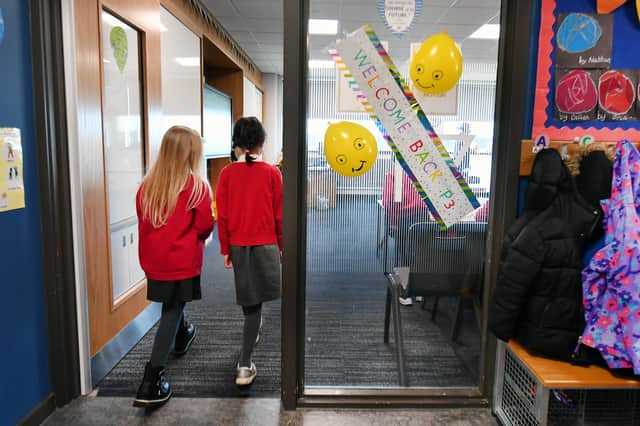Cameron Wyllie: We need to know the post-Covid plan for Scottish education - before the election


‘I’m just lucky I have lived my life when I did. I feel so very sorry for young people.’
This, of course, speaks volumes for her total lack of self-pity and it made me ashamed about my own moaning about cinemas and restaurants and foreign travel. She was reflecting, of course, a very popular current refrain, and she was entirely right: young people have lost a year of their youth, locked down with their families, being taught by screens or worse, behind fences in student accommodation – no parties, no fun, their social lives mostly reduced to Facetime and Skype as they sup at their Pot Noodles. I think most of us, reflecting on our own sunny days at school or college or university, feel that young people particularly deserve our sympathy.
Advertisement
Hide AdAdvertisement
Hide AdHowever, as another wise friend of mine – a woman of rather lesser years – pointed out to me, it’s important that we don’t start talking about a ‘lost generation’. Pleasingly, very few young people have been badly physically affected by COVID, and while the privations of lockdown must seem like they are stretching out eternally, the vast majority of them will, I think, bounce back. They will work hard, supported by teachers and parents; soon they will be on playdates and at sleepovers while their older siblings are at music festivals and in pubs. My own grandmother’s constant refrain was ‘You’re only young once’ as she pressed another fiver into my eager hand; and yes, most of our boys and girls will readjust with gusto, and the past year, like a very boring, long, sci-fi film, will fade in their collective memory.
There are, however, two groups of young people who will need attention, work and money lavished on them and their well-being, and two recent reports must cause the Scottish Government concern.
A report in the British Journal of Psychiatry on a study on a study of 19,000 young people from all over the UK born at the start of the millennium found that 7 per cent of them have attempted suicide by the age of 17 and nearly a quarter of them have self-harmed. For those of us with any recent experience of the pastoral care of young people these figures might not come as too much of a surprise, but they are horrifying nonetheless. In the average S5 class of say, 24, there will, on average, be one or two young people who have made a serious effort to end their lives and, four or so more who have hurt themselves deliberately. The pandemic, one assumes, can scarcely improve these levels of harm.
For years now Child and Adolescent Mental Health Services (CAMHS) has been very stretched, able to deal only with the most horribly urgent cases with any speed. It is vital, as youngsters emerge from home and return to school that the Scottish Government commits to vastly increasing resources aimed at helping young people’s mental health. Yes, most kids will be fine but the most fragile among them will need specialised psychological and psychiatric care delivered speedily. CAMHS has been underfunded for years and years – let this be the turning point.
Of course, I have maundered on endlessly over the past year about the need to quantify the impact – or lack of it – of online and ‘blended’ learning. While the great majority of young people’s mental health will continue to be fine, my guess is that, educationally, many, perhaps almost all, will have suffered to some extent, but, quite clearly, children with educationally engaged parents and those who have had the best online teaching will be quicker to mend. Recently, the Department of Education in England published a report which said that pupils from poorer areas have suffered 50 per cent more ‘learning loss’ than pupils from wealthier areas. It would be astonishing if this is not replicated in Scotland and, it is, of course, exactly the opposite of the Scottish Government’s highly laudable intention of closing the poverty-related attainment gap. Who knows where that lies now? As soon as possible – and preferably before we vote – the Scottish public needs to know what extra support is going to be in place for, let’s say, the next two years, to support these young people who, through no fault of their own, have been less able to benefit from whatever educational offer their committed and often inspired teachers have been able to offer. We will need a legion of volunteers, vaults full of resources and enormous goodwill on the part of a beleaguered teaching profession, but mostly schools will need more funding, both generally and through the Pupil Equity scheme. These structures need planning and foresight, because they cannot afford to fail.
This is, of course, not just about helping those young people who harm themselves and those school pupils who are educationally most vulnerable. It’s about ensuring that their teachers and their parents can avoid a decade of worry and recrimination and guilt, and it’s about letting Rosemary and her generation, whose central concern as the summer and greater freedoms come, remains about young people, have some assurance that their own heartbreaking sacrifices have been worthwhile. Let’s have much more Pupil Equity Funding and a vast increase in the CAMHS budget on the table very soon, please.
Cameron Wyllie’s blog is ‘A House in Joppa’.